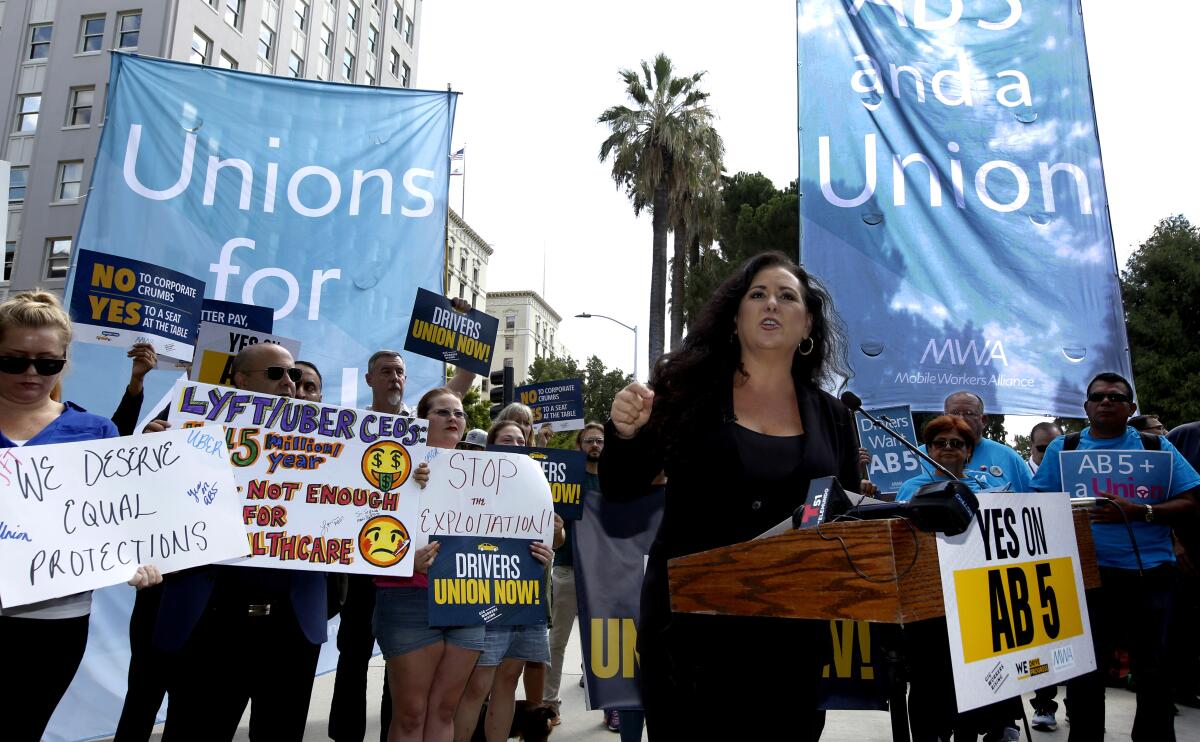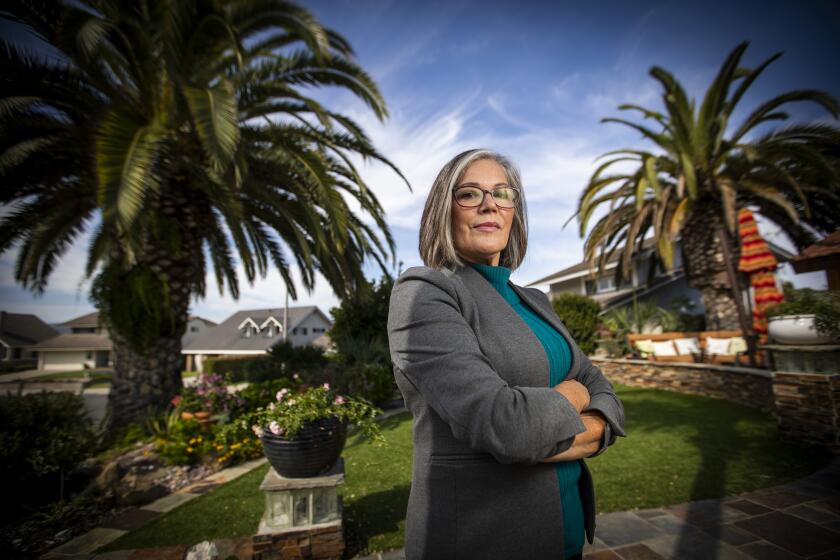Lorena Gonzalez likes a good fight. She got it with hotly debated AB5

- Share via
SACRAMENTO — The framed letter in Assemblywoman Lorena Gonzalez’s office, displayed with pride, was hardly meant as a compliment.
“This document constitutes formal notice and warning that you are no longer allowed on property owned by Wal-Mart Stores, Inc., or in any area subject to Wal-Mart Stores, Inc.’s control,” warns the statement from 2012.
Then the leader of San Diego’s organized labor council, Gonzalez showed up at a local store to demand higher worker pay and better benefits. Before being escorted out, she was asked to sign a letter banning her from ever coming back.
She did so happily, punctuating her signature with a smiley face.
Seven years later, Gonzalez is no less pugnacious and far more powerful. One of California’s most influential legislators, she has written laws to expand the rights of workers, women and immigrants. In most cases, success has come not in spite of her willingness to pick a fight but because of it.
“I come from a perspective of conflict is good,” Gonzalez said. “You actually get change out of conflict. A polite society ensures the status quo.”
A combination of personal persistence and a focus on hot-button issues has given the 48-year-old liberal lawmaker a national following, one that could boost her chances for higher office — beginning with a campaign for secretary of state in 2022.
Perhaps no fight has been as consequential to her career as the one she began last year to rewrite California employment law and to expand the circumstances under which businesses must create jobs with benefits and pay taxes. Supporters of Assembly Bill 5 see her as a champion for worker rights while critics have painted her as a pro-union zealot unconcerned over what they believe is the law‘s potential to stifle innovation. It has been a bruising battle, marked by state Capitol protests, high-profile fights in court and on social media, and a likely effort to rewrite the law through a statewide ballot measure in November.
Gonzalez isn’t wavering.
“This is an effort to right a ship that’s gone wrong,” she said of AB 5. “And I believe so fully in it that I’m willing to continue to take on what is a lot of piling on. … You’ve got to get it right.”
California companies are scrambling to figure out how AB 5, a sweeping new hiring law, affects them.
That there’s symmetry between what Gonzalez fights for and the struggles of low-wage Californians isn’t by accident. She said she prioritizes her work by its potential impact in her Assembly district, stretching south from San Diego to Chula Vista and the border.
“We do a lot where we say, ‘Somebody has to start the conversation on this,’” Gonzalez said of her legislative agenda. “We really weigh whether it fits into the core things that will help our constituents.”
As chairwoman of the influential Assembly Appropriations Committee, it’s rare when one of her bills fails to make it to the Assembly floor or the governor’s desk. But when that happens, Gonzalez has a reputation for coming back again and again.
In 2019, she wrote laws to expand sexual assault training for female-dominated janitorial jobs; impose a new ban on immigration arrests in courthouses; offer those with allegations of childhood sexual abuse more time to file civil lawsuits; make diaper sales tax-free; and impose a statewide ban on fur trapping. In 2016, she persuaded then-Gov. Jerry Brown to extend overtime pay requirements to farmworkers. And twice in the past four years, she has co-authored strict new rules governing vaccine exemptions for schoolchildren.
“There is no question that Lorena is a powerhouse,” said Assemblywoman Monique Limón (D-Santa Barbara). “She is someone who has big ideas, bold ideas. And she’s fearless.”

Gonzalez grew up in Vista in northern San Diego County with two older brothers in a single-parent household, her parents divorcing when she was a toddler. Her father, Roberto, came from Mexico as a teenager to pick strawberries and later dabbled in a variety of small businesses. Her mother, Carmen Regan, was a nurse who had long wanted union representation while working at Tri-City Medical Center in Oceanside. Gonzalez volunteered at the hospital as a teenager just to spend time with her mother, who she said often worked 60-hour weeks.
Just before Regan died in 2007 from complications of cancer, Gonzalez helped lead a successful campaign to unionize Tri-City’s healthcare workers.
“Everything about my mom fueled my passion in organizing those workers,” said Gonzalez, who speaks frequently and emotionally about her mother. “There are so many working moms out there like my mom. There are so many people who aren’t asking for anything. Just a shot, you know? Just enough to be sure that their kids can do a little bit better.”
She excelled in school, graduating from Stanford and then graduate school at Georgetown, eventually earning a law degree from UCLA. None of it, she said, would have happened had she not learned how to fight for what she wanted.
“I had to push my way to get where I am. Every step of the way,” she said. “I know a lot of people don’t like it, but I wouldn’t be here.”
Gonzalez struggled personally. She became pregnant while in graduate school, and made good on a promise to her mother that she’d still earn her degree. A single mother while in law school, she soon after married, then divorced. She remarried twice more, the final time to Nathan Fletcher, a San Diego County supervisor. Their blended family includes five children from former marriages, ages 8 to 23.
“The family piece of her life is really important,” Fletcher said. “Despite all the demands, she shoulders a really heavy load.”
Gonzalez joined the staff of then-Lt. Gov. Cruz Bustamante in 1999, and in 2005 unsuccessfully ran for a seat on the San Diego City Council. In 2007, she was chosen to lead the San Diego-Imperial Counties Labor Council, succeeding Jerry Butkiewicz, whose daughter was a friend from high school and whom Gonzalez credits as a mentor.
A newspaper article at the time described her as a “pragmatic centrist,” a characterization she now suspects was the result of friends trying to soften her public image.
“They tried to convince people they shouldn’t be scared of me,” Gonzalez said. “I think they realized, ‘She’s really a good person, but she’s going to scare the s— out of people.’”
“She was always pretty clear what her core objectives were and that sometimes you have to ruffle a few feathers to meet those objectives,” said Rusty Hicks, chairman of the California Democratic Party. Hicks served in leadership roles at the Los Angeles County Federation of Labor while Gonzalez led the San Diego group, and says his former counterpart didn’t change when she was elected to the Legislature.
“She’s a brawler,” Hicks said. “And I mean that as a compliment.”
But Gonzalez hasn’t always been applauded for her rough-and-tumble approach to politics. Since her election to the Assembly in 2013, opponents have sometimes taken issue with her style as much as her positions on issues.
During last year’s fierce debate over school vaccine exemptions, anti-vaccine groups posted video clips of Gonzalez online, showing the Democratic lawmaker as she tried to maintain order during long legislative hearings. During a debate on the bill, then-state Sen. Jeff Stone (R-Temecula) once seemed to refer to Gonzalez as the “black widow of public policy” in Sacramento, without mentioning her by name.
“It was a lot of personalized criticism,” Gonzalez said of the vaccine debate. “A lot of death threats. It was emotionally draining.”
But she rarely relents, especially on social media. Whether it’s sparring over one of her proposals, national politics or just about any topic of the day, Gonzalez routinely weighs in.
“Whatever is in her mind is just coming out,” Fletcher said. “She’s going to say it or she’s going to tweet it and you’ll just know where she is.”
Nor has she hesitated to blend the personal with the political, particularly when it comes to her husband. Fletcher served in the Assembly as a Republican before renouncing his party during a failed mayoral race, ultimately re-registering as a Democrat. His electoral comeback as a county supervisor was aided by the political muscle of Gonzalez, whom he married the year before.
Companies and powerful groups with an interest in Gonzalez’s work in Sacramento donated to Fletcher’s nonprofit in 2015. In the 2018 supervisor’s race, Fletcher benefited from almost $1 million in political spending by the San Diego County Democratic Party, its own coffers filled by some $370,000 donated by Gonzalez from her own campaign account — far exceeding what she had given to the local party in prior elections.
But she rejects any suggestion that she unfairly boosted Fletcher’s chances.
“I know my husband. I had no doubts about what kind of elected official he would be. And I was right, by the way,” Gonzalez said. “I’d vote for him to be president tomorrow. Come on, why would I not want him to be county supervisor?”
For now, Gonzalez has placed her presidential hopes on Massachusetts Sen. Elizabeth Warren. And Warren gave the California legislator a boost last summer by endorsing AB 5 as the bill was meeting with resistance in Sacramento.
“I believe in markets and in providing entrepreneurs the chance to succeed,” Warren wrote in a newspaper op-ed at the time. “But markets without rules and workplaces without labor protections are ripe for exploitation.”
The topic has become all-consuming for Gonzalez. In the months since Gov. Gavin Newsom signed AB 5 into law, she’s done little else but field questions and complaints — in person, when protesters showed up at her San Diego office, and in news interviews and online. She has insisted that AB 5 offers important clarity to when a business’s work can be done by an independent contractor, offering a more lenient system than would otherwise apply under a high-profile California Supreme Court ruling from 2018.
On Thursday, Gonzalez announced on Twitter that she will soon unveil new legislation “to help ease the implementation” of the law, specifically promising to examine concerns raised by freelance journalists, photographers and musicians. “This is just a piece of the clarifications you will see” in the coming weeks, she wrote.
The promised efforts come after blistering criticisms of both the tone and substance of her defense of AB 5.
“From looking at your own posts, I sense a truly disturbing indifference,” Vanity Fair correspondent Anthony Breznican wrote in a tweet last month. “Prove you are not that person. People are begging you for a fix. They will remember when it comes time to vote.”
Modifications will mollify some, but not all, of the law’s critics. Republican lawmakers have introduced a series of bills in the Legislature to exempt additional lines of work from the limits on independent contractors. At least one bill seeks to fully repeal AB 5, and drew a boisterous crowd to a state Capitol rally on Jan. 28.
“We have continued work to do,” Gonzalez said in an interview with The Times. “And it takes a lot of work, it takes a lot of my time to meet with so many people. And I think that gets lost. What I don’t like is when people are like, ‘Repeal it.’ I’m like, ‘Are you kidding me?’”
Few disputes over AB 5 were more intense than those Gonzalez had with the trucking industry and app-based companies such as Uber and Lyft. Trucking groups have won two early court battles against the law, while the tech companies have turned to the ballot: Uber, Lyft and DoorDash have put a combined $100 million in a political campaign to ask voters in November to rewrite the law.
And the fight is likely to continue to be as much about her as the policy. In the federal lawsuit filed against AB 5 on Dec. 30, attorneys for Uber and Postmates singled her out — complaining that “this hostility toward the on-demand economy held by Assemblywoman Gonzalez” led to the law’s passage.
That night, Gonzalez responded in kind on Twitter.
“Come and get me tech bros,” she wrote. “I’m here every single day to take on the plight of workers against big tech.”
More to Read
Sign up for Essential California
The most important California stories and recommendations in your inbox every morning.
You may occasionally receive promotional content from the Los Angeles Times.












